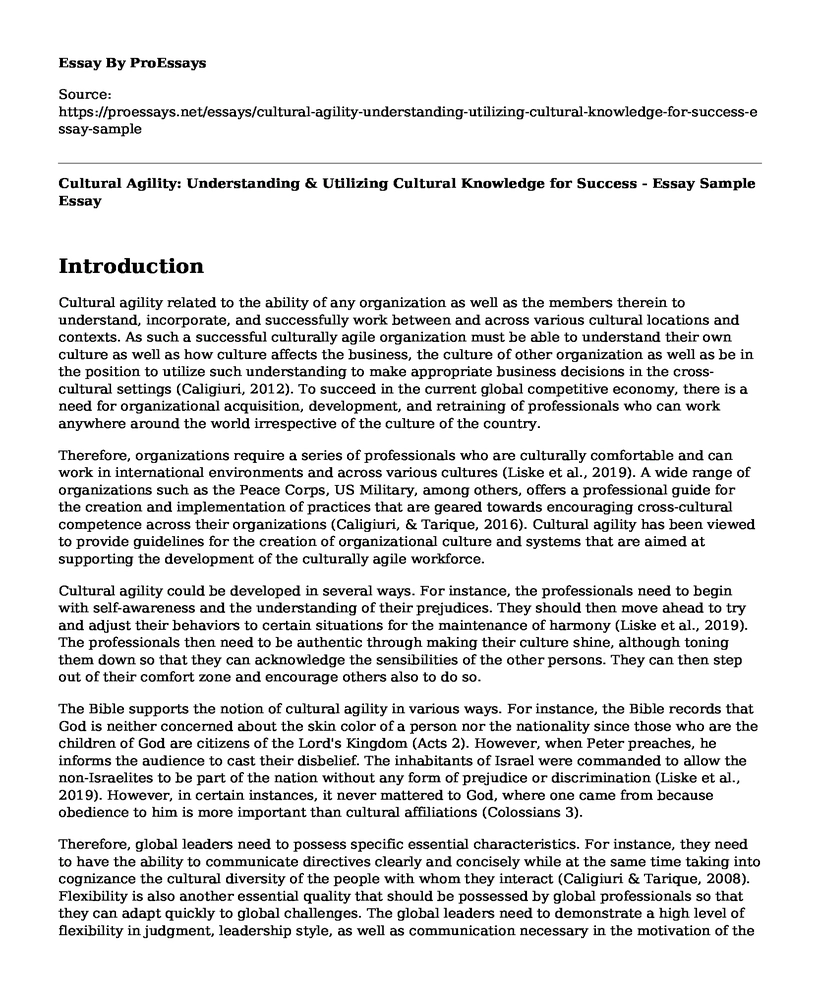Introduction
Cultural agility related to the ability of any organization as well as the members therein to understand, incorporate, and successfully work between and across various cultural locations and contexts. As such a successful culturally agile organization must be able to understand their own culture as well as how culture affects the business, the culture of other organization as well as be in the position to utilize such understanding to make appropriate business decisions in the cross-cultural settings (Caligiuri, 2012). To succeed in the current global competitive economy, there is a need for organizational acquisition, development, and retraining of professionals who can work anywhere around the world irrespective of the culture of the country.
Therefore, organizations require a series of professionals who are culturally comfortable and can work in international environments and across various cultures (Liske et al., 2019). A wide range of organizations such as the Peace Corps, US Military, among others, offers a professional guide for the creation and implementation of practices that are geared towards encouraging cross-cultural competence across their organizations (Caligiuri, & Tarique, 2016). Cultural agility has been viewed to provide guidelines for the creation of organizational culture and systems that are aimed at supporting the development of the culturally agile workforce.
Cultural agility could be developed in several ways. For instance, the professionals need to begin with self-awareness and the understanding of their prejudices. They should then move ahead to try and adjust their behaviors to certain situations for the maintenance of harmony (Liske et al., 2019). The professionals then need to be authentic through making their culture shine, although toning them down so that they can acknowledge the sensibilities of the other persons. They can then step out of their comfort zone and encourage others also to do so.
The Bible supports the notion of cultural agility in various ways. For instance, the Bible records that God is neither concerned about the skin color of a person nor the nationality since those who are the children of God are citizens of the Lord's Kingdom (Acts 2). However, when Peter preaches, he informs the audience to cast their disbelief. The inhabitants of Israel were commanded to allow the non-Israelites to be part of the nation without any form of prejudice or discrimination (Liske et al., 2019). However, in certain instances, it never mattered to God, where one came from because obedience to him is more important than cultural affiliations (Colossians 3).
Therefore, global leaders need to possess specific essential characteristics. For instance, they need to have the ability to communicate directives clearly and concisely while at the same time taking into cognizance the cultural diversity of the people with whom they interact (Caligiuri & Tarique, 2008). Flexibility is also another essential quality that should be possessed by global professionals so that they can adapt quickly to global challenges. The global leaders need to demonstrate a high level of flexibility in judgment, leadership style, as well as communication necessary in the motivation of the team.
Moreover, global leaders should recognize their abilities to change the world. As such, they must be able to understand the impacts that the social and environmental policies have on the local and the global communities (Liske et al., 2019). Honesty and authenticity is an essential quality of a worldwide leader. It has been noted that the actions and words of the leaders can reach millions of audiences around the world, especially in today's social networking (Traylor & Caligiuri, 2019).
References
Caligiuri, P. (2012). Cultural agility: Building a pipeline of successful global professionals. John Wiley & Sons.
Caligiuri, P., & Tarique, I. (2008). 12 Developing managerial and organizational cultural agility. The peak performing organization, 234.
Caligiuri, P., & Tarique, I. (2016). Cultural agility and international assignees' effectiveness in crosscultural interactions. International Journal of Training and Development, 20(4), 280-289.Retrieved from https://doi.org/10.1111/ijtd.12085
Liske, C. D., Ramsbotham, J., Strickland, K., Tutticci, N. F., Liu, Y. W. J., Noureddine, S., ... & Waweru, S. (2019). Global Leadership: Characteristics and Commitment Developed Through Community. http://hdl.handle.net/10755/18951
Traylor, A., & Caligiuri, P. (2019). The study buddy effect: studying abroad with a close friend and the development of cultural agility. Research in Comparative and International Education, 14(4), 466-476. Retrieved from https://journals.sagepub.com/doi/abs/10.1177/1745499919894073
Cite this page
Cultural Agility: Understanding & Utilizing Cultural Knowledge for Success - Essay Sample. (2023, Apr 01). Retrieved from https://proessays.net/essays/cultural-agility-understanding-utilizing-cultural-knowledge-for-success-essay-sample
If you are the original author of this essay and no longer wish to have it published on the ProEssays website, please click below to request its removal:
- Research Example: Literature Review on Diversity Practices of HR Management in a Multicultural Environment
- Essay Sample on Museum Reinventing
- Family as a Basis of Social Hierarchy in Developing US - Essay Sample
- Essay Example on Mom Teaches Daughter Life-Lessons: Benefits of Moral Values
- The Patriarchal Tradition: Late Marriage in the 1500s-1800s - Essay Sample
- Essay Example on Live Art: Bringing Innovation to Performance & Events
- Essay Example on My Dad, My Hero: A Father's Unwavering Dedication







